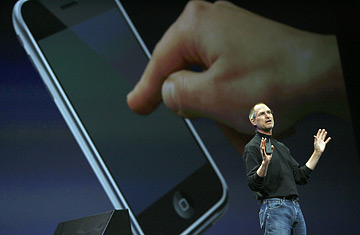
Apple chief executive Steve Jobs unveils a new mobile phone that can also be used as a digital music player and a camera, a long-anticipated device dubbed an "iPhone."
(5 of 5)
That doesn't mean Apple can operate beyond the boundaries of the Securities and Exchange Commission. But the iPhone wouldn't have happened without Apple's "we're special" attitude. One reason there's limited innovation in cell phones generally is that the cell carriers have stiff guidelines that the manufacturers have to follow. Carriers demand that all their handsets work the same way. "A lot of times, to be honest, there's some hubris, where they think they know better," Jobs says. "They dictate what's on the phone. That just wouldn't work for us because we want to innovate. Unless we could do that, it wasn't worth doing." Jobs demanded special treatment from his phone-service partner, Cingular, and he got it. He even forced Cingular to re-engineer its technical infrastructure to handle the iPhone's unique voice-mail scheme. "They broke all their typical process rules to make it happen," says Tony Fadell, who heads Apple's iPod division. "They were infected by this product, and they were like, 'We've gotta do this!'"
Now that the precedent has been set, it will be interesting to see if other cell-phone makers start demanding Apple-style treatment from wireless carriers. Stanley Sigman, Cingular's president and CEO, committed his company to the iPhone two years ago sight-unseen, but he appears understandably eager to play down the uniqueness of Apple's deal. "I think the interesting aspect of it is our willingness and ability to work together, to allow Cingular to be Cingular and Apple to be Apple," he says. "We have great relationships with other manufacturers. But he's clearly brought a product to market that's years ahead of anybody else." It will also be worth watching to see how successful competitors will be in knocking off the iPhone's all-screen form factor, which will be tricky without Apple's touch-screen technology. Apple has filed for around 200 patents associated with the iPhone, building an imposing legal wall.
Will the iPhone succeed? Well, what's success? Apple will break the 100 million mark with iPods this year (it also passed 2 billion songs sold on iTunes). Jobs says he wants to move 10 million iPhones by the end of next year. That number is well in character as far as its ambition goes. The iPhone is exclusive to Cingular for now, and Cingular has only 58 million customers. Jobs hopes to launch in Europe late this year and Asia in 2008. The iPhone is too beautiful and too brilliant not to be a moneymaker, but it'll be a slow burn by iPod standards.
Perhaps it's not quite right to call the iPhone revolutionary. It won't create a new market or change the entertainment industry the way the iPod did. When you get right down to it, the device doesn't even have that many new features--it's not like Jobs invented voice mail, or text messaging, or conference calling or mobile Web browsing. He just noticed that they were broken, and he fixed them.
But that's important. When our tools don't work, we tend to blame ourselves, for being too stupid or not reading the manual or having too fat fingers. "I think there's almost a belligerence--people are frustrated with their manufactured environment," says Ive. "We tend to assume the problem is with us and not with the products we're trying to use." In other words, when our tools are broken, we feel broken. And when somebody fixes one, we feel a tiny bit more whole.
